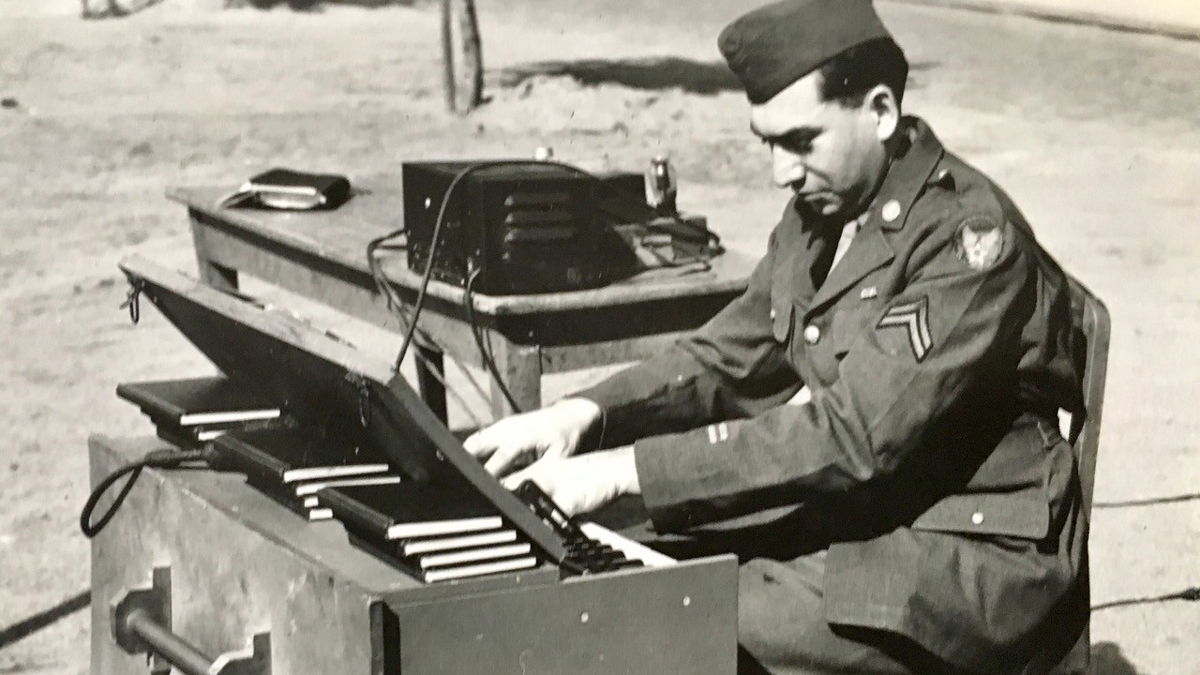CARBONDALE, Ill. — A chamber music concert that celebrates the work of American composer Lionel Semiatin, along with the dedication of a substantial portion of his work to Southern Illinois University Carbondale’s Morris Library Special Collections Research Center, is set for Wednesday, June 7.

American composer Lionel Semiatin creates music on the beach at Normandy during World War II. (Photo provided)
The Lionel Semiatin Collection Dedication Concert is at 3 p.m. in the library’s third-floor rotunda. Admission is free. Excerpts of the collection, featuring a variety of chamber ensembles of Semiatin’s works, will be performed by 24 members of the Southern Illinois Music Festival orchestra as part of the 2023 Southern Illinois Music Festival under the artistic direction of Edward Benyas, professor of oboe and conductor.
Semiatin wrote a number of compositions during the Battle of Normandy in July 1944 and created much of his “American Symphony” while on battlefields. He visited Carbondale in 2014, the year before he died at age 98, to hear three of his pieces performed at that year’s music festival during a D-Day 70th anniversary concert.
One of the compositions to be performed on June 7 are two movements from the “American Septet,” which is Semiatin’s own arrangement for two winds, four strings and piano. An exhibit documenting Semiatin’s remarkable life and legacy will be displayed during the reception following the concert.
Working with Benyas and Library Affairs Dean John Pollitz and Associate Dean Anne Marie Hamilton-Brehm, Semiatin’s family donated a substantial portion of the composer’s manuscripts of orchestral, chamber and sacred music and correspondence to the library’s Special Collections Research Center. Semiatin’s daughter and granddaughter will also perform in the June 7 concert.
Born in Dublin, Ireland, in 1917 to a Jewish family, Semiatin immigrated to the U.S. with his family when he was 3 and began composing music in his youth. Serving in the Army during World War II, he was sent to Normandy a week after D-Day and assigned to guard the fuel dump of the first air force fighter base there during the night.
Because of his musical abilities, he was assigned to the chaplain’s office overseas and played the organ for troops during services for all denominations. After the war, Semiatin worked in fundraising for a Jewish organization before moving with his wife, Edith, to White Plains, where he worked at Temple Israel Center, serving as executive director from 1953 to 1982.
Influenced by jazz, Semiatin studied the art and science of composition throughout his life, composing modern chamber and symphonic music that was performed by the Westchester Philharmonic, the Columbia University Orchestra, the Omaha Symphony, the Alexandria Symphony and other symphony orchestras around the United States and Canada.
